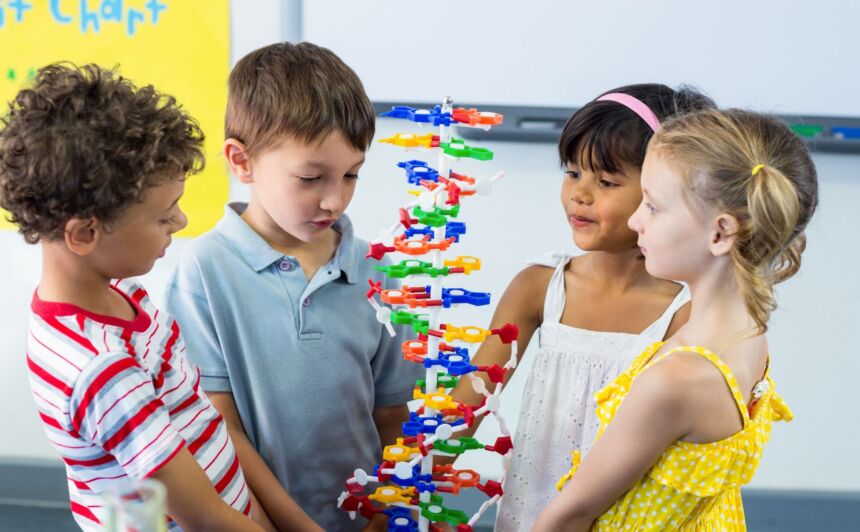The overarching goal of the Learning Schools portfolio is to foster a global school system that facilitates the generation and transfer of research and good practices, allows for peer-learning among schools and incentivizes evidence use for teaching and decision-making. To maximize our impact, we work together with so called school aggregators: organizations or institutions that group a large number of schools within and across national education systems. Schools2030 is one of these school aggregators.
Through a joint vision to demonstrate the agency of teachers as catalysts for positive change to improve holistic learning outcomes, Schools2030 and the Jacobs Foundation are set to embark on three years of bottom-up school solutions and research with ambitions both to empower schools at the local level, as well as to adapt and scale education innovations globally and inform systems-change.
A shared vision for change
The Jacobs Foundation has been a fundamental partner of Schools2030 from its inception – the two are very much aligned in their vision and approach to education systems change in that they are both in the business of generating evidence at school level that can drive action towards greater local and global impact. Given this shared vision and methodology, the renewed three-year partnership between Schools2030 and the Jacobs Foundation will build on both the shared achievements thus far (including the recently launched Schools2030 HCD Toolkit) as well as embark on some new initiatives together.
Supporting teachers to become education policy entrepreneurs
With support from Jacobs Foundation, Schools2030 is working to support teachers across 1,000 schools (100 in each of the program’s ten geographies) to design, create and test micro-improvements in their classroom contexts.
Schools2030 will also work alongside the Jacobs Foundation to create and deliver a new ‘Teacher Solutions Bootcamp’ (TSB) package across the target schools. The ultimate aim is that the TSBs will be deployed as a new, cost-effective package that will enable any school educator or school leaders, anywhere, to effectively pitch their ideas for improving quality learning outcomes and environments to the global education community.
The TSBs will equip teachers with the knowledge, skills, and tools to best disseminate their solutions in a meaningful, compelling, and influential way so that schools themselves are seen the critical constituency in future education decision-making tables.
Further, the TSBs will support more teachers from more parts of the world to learn more effectively together, to collaborate and to replicate evidence-led school practices across global contexts.
Contributing knowledge to the global field of ‘Learning Variability’
Learning variability – the idea that students’ learning abilities and processes are naturally heterogenous as a result of their gender, ethnicity or other attributes of their background – is not a new area of education research, yet there is very little empirical evidence on how individualized learning and adaptive teaching can be implemented in schools, and under what conditions they are effective. For the Jacobs Foundation and Schools2030, understanding how learning variability plays out in practice in different classrooms is vital to ensure education programming and policy are inclusive, gender-responsive and truly ‘leave no one behind’. Developing an evidence-base that can ensure that education policy and teaching methodologies take into account these differences will form the core of this workstream, which also aligns with and builds on the Jacobs Foundation’s Learning Minds portfolio.
Generating evidence to improve quality learning
The Jacobs Foundation will support Schools2030’s second Global Call for Research Proposals (CfP), which will award new grants of 150,000 USD each to three research partners (with a further commitment of six more over the subsequent two years). The first CfP took place in 2020, with research grants awarded to partners across East Africa, Central Asia and Pakistan, all seeking to answer the question “How and what are children learning through their participation in Schools2030?”. For these subsequent CfPs, Schools2030 will work with Jacobs Foundation and its network of research fellows and technical experts. The new rigorous data and evidence-base will not simply answer the question of ‘what works’, but rather ‘what works for whom’, ‘how’, and ‘why’ across Schools2030’s ten-country portfolio.
Growing the evidence – building the network
With a shared vision and a set of comprehensive activities and workstreams in place, the partnership between Schools2030 and Jacobs Foundation is set to challenge previous top-down education programming with new evidence supporting teacher and school agency from the bottom up. By helping teachers know how to best communicate and share their solutions within and beyond their communities of practice, Schools2030 aims to support the Jacobs Foundation’s vision of reaching 10% of the world’s schools by 2030. Further, the partnership expands a ground-breaking network of globally informed and locally rooted researchers that together will make a significant contribution to the field of learning variability over the next three years and beyond.
